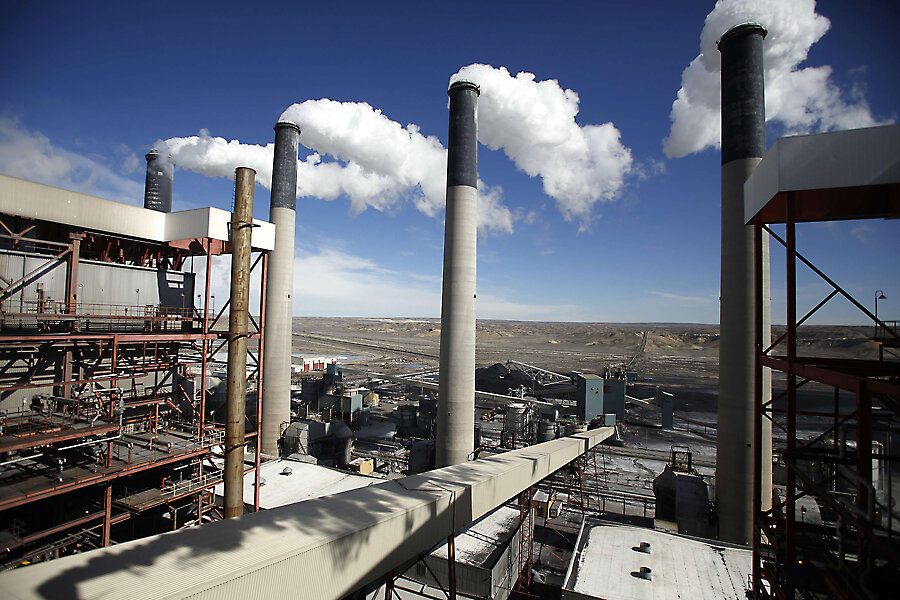BP's two-word fix for global climate change
Loading...
One of the world's largest energy companies is warning about rising carbon emissions. And it's endorsing a surprisingly simple solution.
Global carbon emissions will continue to rise roughly 1 percent each year through 2035, according to a report released Tuesday by London-based BP, one of the world's six oil-and-gas supermajors. That puts emissions growth on a path that would be "materially higher" than what most scientists say is necessary to keep global warming within 2 degrees C. In other words, if the world continues to burn fossil fuels at its current rate, Earth's average temperature will rise higher than what most scientists regard as safe levels.
In its report, BP lays out a variety of ways policymakers and businesses could prevent that from happening, including boosting renewable energy production, limiting carbon-heavy coal use, and making energy systems more efficient. It concludes that no one approach will be enough to meet emissions reductions goals, but offers a simple idea that would help guide efforts: carbon pricing.
"History has shown the power of market forces in making economies less energy intensive as people have found more efficient ways to use energy," BP chief executive Bob Dudley said in prepared remarks Tuesday. "A global carbon price would help to unleash market forces and provide the right incentives for everyone to play their part."
Carbon pricing isn't a new idea – variations on the system are already in place or being planned for in Europe, China, and parts of the US. It typically takes the form of either a carbon tax or a cap-and-trade system. In the former, companies must pay a penalty for each unit of carbon emissions they produce. In the latter, a limit is placed on total emissions for a region or industry, and companies can buy or sell individual allowances depending on how much they plan to emit.
Why, then, would a company that profits from fuels partly responsible for rising emissions support an added cost to the consumption of those fuels?
Part of it is that the energy industry values predictability and stability, particularly when it comes at the international level. It is likely that governments across the globe will continue to place limits on carbon emissions, and multinational companies like BP would prefer those limits to be as uniform and as transparent as possible. A widely agreed-upon global price on carbon would allow BP to continue operating in a variety of countries while minimizing the need to tailor each of its projects to local rules and restrictions. Carbon pricing is also generally regarded as a more economically efficient way to incentivize cleaner energy than subsidizing or mandating the construction of specific technologies.
"A meaningful global carbon price would provide the right incentives for the most cost-effective decisions and investments to be made," BP's report reads.
Another motivating factor could be that energy firms themselves also stand to suffer should rising greenhouse gas emissions significantly alter the climate. Most scientists project that rising temperatures will lead to stronger and more frequent extreme weather – the kinds of storms, droughts, and other events that can disrupt plans to produce or explore for new energy resources.
Of course, a global price on carbon is easier said than done. The US tried and failed to implement a cap-and-trade system in 2009, and Europe's emissions trading system has run into various troubles. But carbon pricing has been implemented successfully on smaller scales, and some hope this year's climate talks in Paris can result in a functioning global price on carbon.
Without it, the world is likely to continue to see ballooning carbon emissions, the vast majority of which will come from China, India, and other quickly growing economies. By 2035, over 70 percent of carbon emissions will be produced by countries outside the Organization for Economic Co-operation and Development, according to BP, although emissions per capita in the non-OECD countries will still be less than half the OECD level. It's a shifting balance of power that is expected to define energy for decades to come.
For oil, historically trade flows have been east to west – big oil producers in the east supplying big oil consumers in the west," Mr. Dudley said in his remarks. "But the strong growth in US tight oil [production] over recent years is having a dramatic impact. The flow is swinging around to go more from west to east and that swing is likely to get stronger driven by demand growth from China and India."








